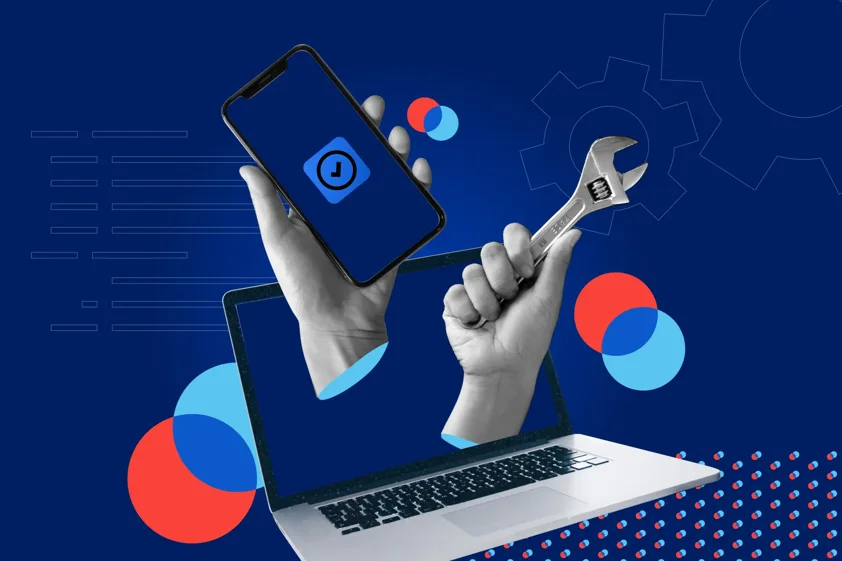The Project Manager (or PM for short) quickly enters the digital experience development process. To demystify this role, we went straight to the source to dive into the world of these delivery maestros, aiming to understand their central role, their routines and the qualities required to make them key players in the success of our projects.

The contribution of Project Managers on customer expectations
To simplify their role, we can say that project management is the glue that binds different implementation teams to the customer’s vision. Indeed, the Project Manager ensures smooth communication both internally and externally and ensures that the project progresses on time and within the budget. Since the Project Manager has to work with a variety of teams, it is essential to have a thorough understanding of all the sectors with which he or she works, to be self-taught by nature, and to have a willingness to progress rapidly. “Team members are not experts in particular fields, all team members are multidisciplinary or seek to be. The project management role is one that requires diversified experience.” says Mohamed Rebai, Project Office Manager at nventive.
Project Managers take on a primary responsibility within projects. Their main mission is to coordinate communication between all parties involved, while anticipating and minimizing potential risks. Added to these many responsibilities, are the responsibilities of maintaining customer confidence by guaranteeing the quality, deadline compliance and cost control of the deliverables. They contribute to the team’s visibility of customer expectations, customer satisfaction, and the quality of expected deliverables.
In essence, they act as a bridge within the team, ensuring fluid communication throughout the project, whether through customer meetings, internal exchanges with the executive team, or Daily Scrum. This way, they are able to keep an eye on the management of potential issues in order to be proactive in the face of what might arise. Project management also entails being responsible for dealing with the little unexpected events that can occur in a project, a reality often referred to as commonplace in the technology field.

The 3 fundamental qualities of an outstanding Project Manager
Communication is Key
If there is a consensus among the Project Managers team, it is that having a strong ability to communicate clearly and concisely with one’s team is essential for success in this role.
Being in constant contact with internal and external parties, including both established and new contacts, it is imperative for the Project Manager to know how to convey all relevant information in the most understandable and eloquent manner possible, regardless of the circumstances. Professionals in this role may need to deliver unwelcome news to clients, and in these instances, it is important to convey the message in a reassuring manner while upholding composure and tranquility.
Furthermore, a Project Manager must be an excellent communicator from the very first interaction with new clients, as once the contract is signed, they become the official voice of the company. Everything they say and do will affect the company’s image and reputation in the eyes of the client.
Good communication must also apply internally, with team members. naturally, managing projects also means being able to maintain serenity and order during stressful periods when colleagues are juggling multiple projects simultaneously and client demands may pile up. In these situations, it’s invaluable to have someone down-to-earth who knows how to keep calm and lift their team’s spirits. The ability to communicate effectively, whether delivering positive or negative news, is a major asset in the field of Project Management.
Strategic Insight
In order to effectively anticipate product development in due course, it is crucial for a Project Manager to know how to foresee risks, downfalls and deliverables.
This is where the Project Manager’s role comes into play, as they must identify these risks, assess them, and develop mitigation plans to minimize their impact on the project. This proactive approach contributes to maintaining project stability, even in the face of unexpected circumstances.
In a constantly evolving technological environment, you have to constantly adjust and keep in mind that, along the way, there will be many small, unavoidable hazards. Project management also entails the ability to tackle these unforeseen challenges and keep the project on track despite the obstacles that may arise.
The Sense of Priorities
The sense of priorities begins when one is able to discern what is important, from what is urgent. The PM must be able to determine the order of activities that need to be accomplished in order to maximize results and the efficiency with which their team delivers their deliverables.
This means resisting the temptation to be overwhelmed by important, but less urgent tasks that may divert attention from the primary objectives.
It’s essential for the person in charge to meet deadlines for all ongoing projects while juggling their personal schedule, those of their colleagues, and their clients. They must remain flexible and constantly readjust to the different realities of daily life.
“The PM team is dedicated to the quality of work, both internally and with clients. The team always strives to unify and enhance the services they provide.” Diane Hihla, Project Manager at nventive

8 hours in 45 seconds
A Project Manager’s typical day is a series of events that turn their weeks into a real adventure. Being the key players in a project, their involvement is essential as they contribute to the project from the very beginning.
Project Managers organize and take part in several follow-up meetings throughout the day. These meetings make up between 50% and 70% of their time. They play a crucial role in communication among all involved parties. First, externally, they may schedule client meetings to discuss progress and reconfirm certain needs. Then, internally, there are discussions with the team to assess task progress or to address raise blocking points with the company’s directors or any other teams, such as quality assurance (QA), marketing or finance. These meetings ensure that everyone has access to the same information, ensuring a smooth progression in the project.
The rest of the time is devoted to project planning and organization using tools such as dashboards, risk registers, schedules, and budget tracking tools to reflect the most accurate state of the project. Project organization and planning can also include managing meetings, responding to emails, and updating documents.
In summary, the goal of Project Managers is to maintain up-to-date practices to facilitate the work of developers and other team members. They are the guardians and conductors of the smooth progress of projects, Ensuring that fluid communication is maintained with the customer, the team and the company as a whole. Thus, they ensure that all the puzzle pieces fit together harmoniously to achieve the objectives set by all parties.






